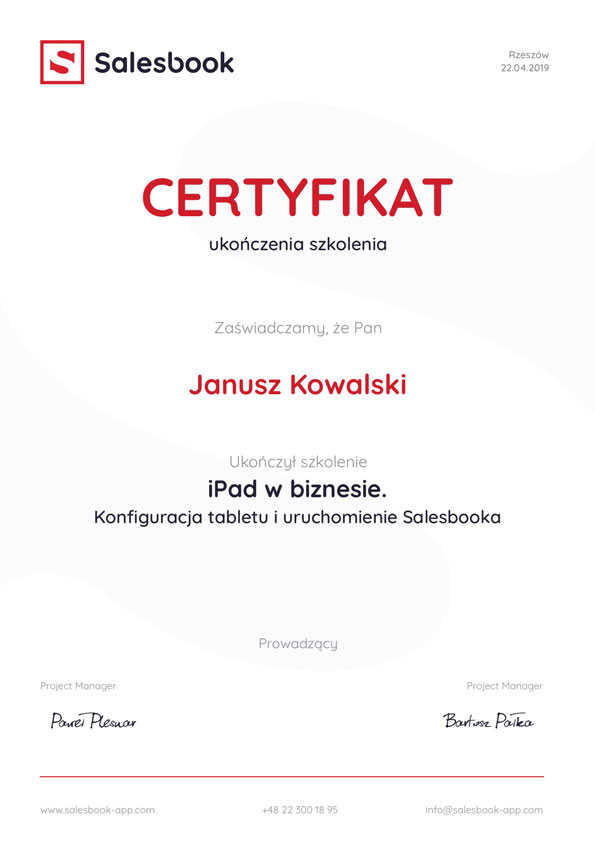

Sales

15 Jan 2024
In the high-stakes world of sales, a perennial question looms large for sales directors, strategists, and professionals alike: what propels the greatest level of success? Is it the innate talent of the salesperson, equipped with a natural charisma and instinct, or is it a meticulously crafted, proven sales process merged with talent management that any individual can be trained to follow? This conundrum presents a nuanced challenge, one that industry leaders and academics have debated for decades.
The Harvard Business Review illuminates a critical juncture in sales strategy, emphasizing that while standout sales reps can eclipse their peers in performance, a well-orchestrated sales strategy plan can raise the bar for the entire sales team, often culminating in a superior cumulative output (Jones, D., & Smith, A., 2020). The inherent charisma, emotional intelligence, and persuasive prowess that characterize natural sales talent are elements tough to replicate and scale. However, a standardized sales process presents a pathway to consistency and replicable victories, vital for the entire sales department.
In this realm, Salesbook shines, embodying not a choice but a convergence between talent and process. It’s an alchemy of innovation, drawing on the real-world experiences of gifted sales professionals. This tool uses its analytical prowess to dissect their approaches, decisions, and techniques, subsequently architecting an ideal sales process that even the most average sales reps can follow to enhance their sales efforts, ensuring a healthy sales pipeline and more closed deals.
The brilliance of Salesbook lies in its dual respect for the art of salesmanship and the science of a defined sales process. It’s not about canned sales pitches; it’s about understanding the psychology of prospective customers and engaging them with solution selling that meets their needs. By utilizing advanced analytics and AI, Salesbook provides personalized feedback on each sales rep’s performance, offering a unique perspective on how sales processes can be refined to bolster individual strengths and mitigate weaknesses. This approach is invaluable for sales managers aiming to hit their revenue targets.

This dual approach was evidenced in a case study with Polaris, a client of Salesbook. The company has recorded significant savings in salespeople’s time – of as much as 85%. (Salesbook, 2023). This increase was credited not just to enhancing the sales team’s innate skills but also to implementing a success-driven sales methodology, informed by the habits of their most proficient members.
The sales arena has long been a battleground where the importance of innate talent clashes with the systematic rigor of an established process. On one side of the debate is a school of thought that advocates for the natural abilities of salespeople — their charisma, empathy, quick thinking, and intrinsic persuasive power. These proponents argue that such qualities, often unteachable, are the cornerstones of meaningful customer relationships and, ultimately, closing deals.
Supporting this perspective, a study from the Journal of Personality and Social Psychology suggests that extraversion, agreeableness, and openness — personality traits commonly associated with successful salespeople — significantly influence sales performance (Whitaker, A., & Vohs, K., 2018). This research underscores the notion that certain inherent traits can predispose individuals to excel in sales roles, potentially eclipsing the capabilities of their less innately inclined colleagues.

Conversely, the other side of the aisle champions the sales process, a structured and repeatable strategy encompassing methodologies, tools, and steps that a sales team follows to convert leads into customers. Advocates for process underscore that while talent can be inconsistent and subjective, process is a scalable, objective framework that ensures stability and continuity across sales efforts. A report by the Sales Management Association underscores that companies with a defined sales process witness up to 18% more revenue growth than those who don’t (Sales Management Association, 2019).
Amid this great debate, Salesbook positions itself as a unifying force. Understanding that relying solely on talent can lead to unpredictability and emphasizing process alone may ignore individuals’ unique strengths, Salesbook offers solutions designed to maximize both.
Our platform integrates advanced analytics that help managers identify and nurture the innate strengths of their sales team while providing a streamlined, adaptable sales process. This dual focus ensures that businesses don’t have to compromise on either front, facilitating a sales strategy where talent enriches the process and the process guides talent.
As the debate continues, leading industry voices are recognizing that it’s not a matter of choosing one over the other. The future of sales lies in the integration of both talent and process — a holistic approach that Salesbook not only endorses but also expertly facilitates through its innovative platform.

In an era marked by rapid digital transformation and increased market competition, understanding the dynamics between talent and process in sales is more critical than ever. The global pandemic has accelerated the adoption of virtual sales, a paradigm shift that McKinsey & Company reports has fundamentally changed how deals are made and closed (McKinsey, 2020). In this digital landscape, personal charisma might not have the same impact as in face-to-face meetings, intensifying the need for a solid, adaptable sales process.
Moreover, as remote work becomes standard, companies face the challenge of maintaining consistency and high performance across dispersed sales teams. Here, a well-defined sales process becomes indispensable, providing a structured approach that can be universally applied, regardless of location.
However, this doesn’t diminish the value of talent.The virtual world demands new skills — digital literacy, virtual presentation prowess, and online relationship-building, to name a few. Forward-thinking companies are now tasked with not just identifying these talents but also seamlessly integrating them into their sales processes.
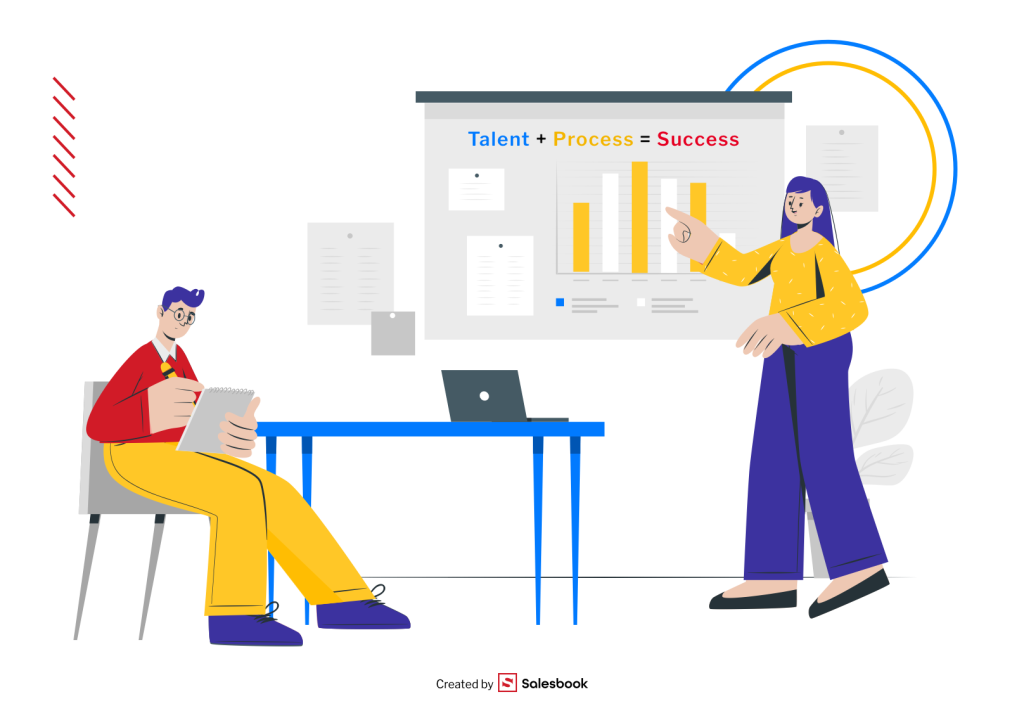
Sales talent is often considered an innate set of qualities that predispose individuals to excel in creating connections, fostering trust, and ultimately, closing deals. These inherent abilities, such as charisma, empathy, and a persuasive nature, are traditionally thought of as traits that one either possesses or lacks, with some industry professionals arguing that they’re the primary drivers of sales success.
Research from the Journal of Marketing, however, suggests a more nuanced understanding (Churchill, G.A., Ford, N.M., Hartley, S.W., & Walker, O.C., 1985). While acknowledging the role of innate abilities, the study posits that sales performance is also influenced by learned skills, knowledge, and internal motivation.
This perspective indicates that while certain people might have a natural affinity for sales, ongoing training, experience, and an enabling environment are crucial for nurturing these talents and achieving consistent results.

“Talent” in sales, a term often shrouded in ambiguity, typically refers to the natural predispositions and inherent qualities that allow individuals to effectively communicate, persuade, and forge meaningful connections — crucial competencies in the world of selling.
It’s a composite of various elements, including but not limited to charisma, emotional intelligence, active listening skills, and a certain level of tenacity and resilience.
The University of Pennsylvania’s Wharton School of Business further elucidates this by identifying specific traits common among top salespeople (Cespedes, F.V., & Hughes, D., 2017). These individuals often demonstrate a high degree of social intelligence, a knack for understanding client needs and motivations, and an ability to adapt communication styles in real-time, responding appropriately to buying signals and objections.
However, defining talent in sales is not without its complexities. While these innate qualities can significantly influence a salesperson’s effectiveness, they don’t operate in isolation. Environmental factors, training, and experience also play substantial roles in shaping an individual’s ability to sell successfully.
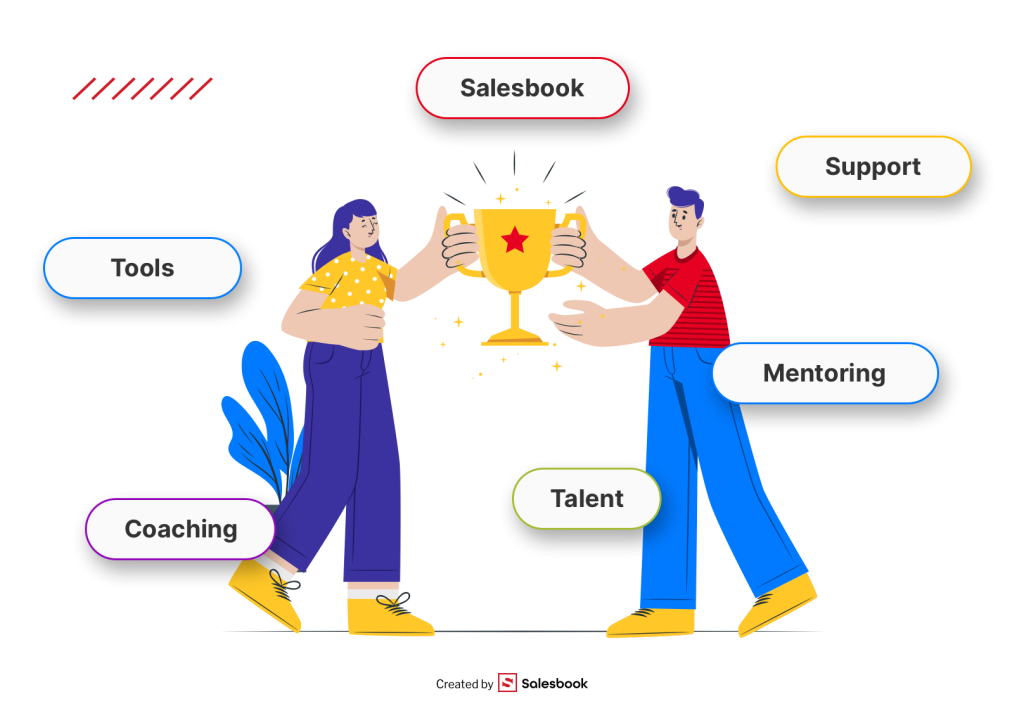
Innate ability, often synonymous with natural talent, holds significant sway in the discourse around sales effectiveness. Research has continually explored the impact of these inherent traits, seeking to quantify and understand how they influence sales outcomes.
A seminal study in the Journal of Applied Psychology delineated a strong correlation between innate personality traits — like ambition, resilience, and interpersonal sensitivity — and high sales performance (Barrick, M. R., Mount, M. K., & Judge, T. A., 2001). The study underscored that individuals possessing these natural inclinations tend to navigate the challenges of sales more adeptly, particularly in building rapport and trust with potential clients.
Further research in the Harvard Business Review identified “emotional intelligence” as a key differentiator among successful salespeople (Goleman, D., 1998). The ability to manage one’s own emotions and effectively discern and respond to the emotions of others was found to be a critical component of sales success, often more so than traditional measures of intelligence, like IQ.
However, while innate ability undoubtedly plays a role, it’s not the sole determinant of success. The organizational environment, access to resources, training, and experiential learning also contribute significantly to a salesperson’s performance. This implies that while talent provides a strong foundation, it’s the cultivation of this talent that yields results.
Salesbook integrates these insights into its platform, acknowledging the value of innate ability while also providing tools and resources for its development. Through data-driven analytics, Salesbook helps managers identify these inherent strengths in their team members and tailor coaching and development programs accordingly. The platform’s emphasis on continuous learning and skill enhancement ensures that innate talent is not just recognized, but fully optimized for sustained sales excellence.

The annals of business history are replete with tales of extraordinary salespeople whose innate talent set them apart and drove remarkable success. These individuals, armed with natural charisma, an instinctive understanding of client needs, and a persuasive prowess that seemed almost second nature, have often tipped the scales in competitive markets, affirming the power of innate ability in the sales domain.
Consider the story of Mary Kay Ash, founder of Mary Kay Cosmetics, featured in Forbes as one of the greatest salespeople of all time (Bertoni, S., 2011). Ash’s natural flair for direct sales, coupled with her genuine passion for empowering women, enabled her to build a cosmetics empire from scratch. Her innate talent for selling was evident in her ability to personally connect with her customers, understanding their desires and aspirations on a profound level.
In the B2B realm, a study published in the Journal of Marketing Research highlighted how a tech company’s top sales executive, owing to his exceptional relational skills and innate ability to understand complex client needs, secured a groundbreaking contract that had eluded his competitors (Aggarwal, N., & Dixon, A., 2020). This deal not only catapulted the company’s revenues but also solidified its position in the market.
While these stories underscore the significance of innate talent, they also hint at something deeper: the importance of an environment that recognizes, nurtures, and leverages these natural abilities. Both examples involve individuals who not only were talented but also operated within structures that supported and amplified their skills.
Salesbook takes this lesson to heart. Our platform isn’t just about identifying talent; it’s about creating success stories. By providing a comprehensive suite of tools that accentuate natural ability — from AI-driven insights that inform personalized sales strategies to real-time analytics that help track and optimize performance — Salesbook ensures that talent doesn’t just thrive, but leads the way.

A robust sales process stands as the backbone of successful sales operations, providing a systematic approach to lead nurturing, conversion, and customer retention. This structured framework, characterized by clearly defined stages and strategies, ensures consistency, predictability, and scalability in sales efforts, qualities that are particularly crucial in today’s ever-evolving market landscapes.
Research from the Harvard Business Review highlights the efficacy of a well-implemented sales process, indicating that organizations with strong sales processes not only drive more revenue but also foster greater customer loyalty (CSO Insights, 2015). This success stems from the process’s ability to create a standardized pathway for sales interactions, ensuring every prospect receives a high-quality, cohesive experience, regardless of the sales representative they engage with.
Salesbook’s platform embodies this principle, offering solutions that reinforce and enhance the sales process. From lead qualification to deal closure, Salesbook’s suite of tools ensures a systematic, data-driven approach, integrating advanced analytics and AI to guide sales strategies, optimize client interactions, and streamline operations. By solidifying the sales process, Salesbook empowers organizations to achieve sustainable growth and long-term success.
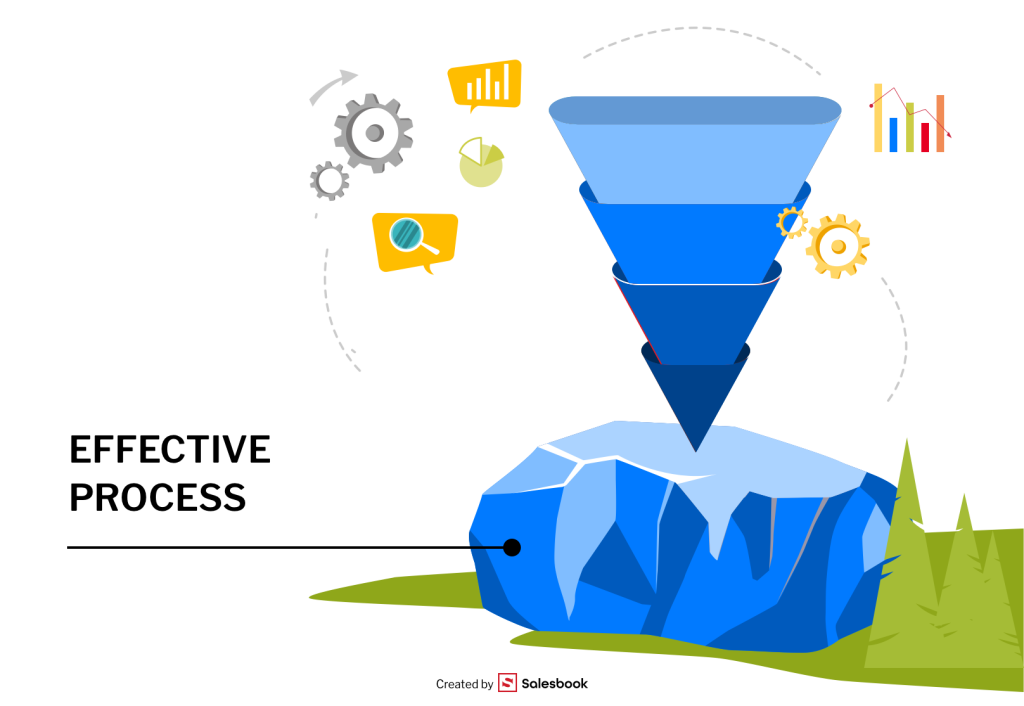
A “process” in sales refers to the strategic sequence of steps that guide the journey from identifying a potential customer to successfully closing a sale. It’s a blueprint for sales activities, providing a standardized approach that enhances efficiency, consistency, and predictability in sales engagements. This process typically encompasses several key phases: prospecting, initial contact, qualification, presentation, handling objections, closing the sale, and follow-up.
Each phase is crucial, serving a specific purpose in nurturing leads and converting them into customers. For instance, prospecting involves identifying potential clients, while qualification filters these prospects into viable leads. The presentation stage is where the product or service is formally introduced, tailored to the client’s specific needs and pain points.
A defined sales process isn’t just a set of guidelines; it’s a strategic roadmap, backed by methodologies and tools that help sales teams navigate the complexities of customer acquisition and retention. By instituting a clear, repeatable process, organizations can ensure every sales interaction aligns with company standards and customer expectations, ultimately driving revenue and fostering client loyalty.
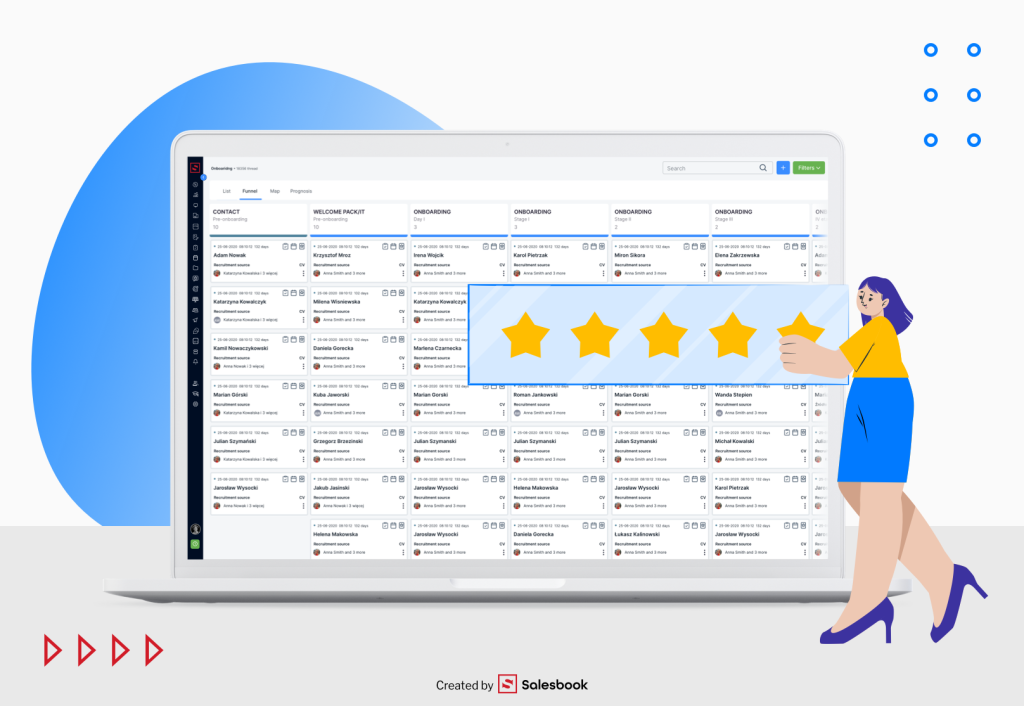
Process-driven success in sales is rooted in the science of consistency and efficiency. Studies, including one from the Harvard Business Review, demonstrate that a structured sales process leads to higher conversion rates, increased customer satisfaction, and improved revenue predictability (Zoltners, Sinha, & Lorimer, 2012).
This success is attributed to the systematic approach’s ability to provide clear guidance on effective sales practices, reduce uncertainties, and streamline decision-making for both sales reps and customers.
Salesbook’s platform leverages this scientific insight, offering tools that standardize best practices, enhance salesforce productivity, and drive sustained growth.

Numerous companies across sectors have harnessed the power of a robust sales process to scale heights and achieve remarkable wins.
IBM epitomizes the efficacy of a process-driven sales strategy, significantly leveraging cognitive computing to anticipate and respond to client needs with unprecedented precision. Their innovative use of an AI-enhanced platform provides sales reps with real-time, data-driven insights, streamlining the sales cycle and ensuring tailored client interactions. This strategy has catalyzed faster sales cycles and deeper market penetration, all underscored by robust and consistent client engagement. By merging process with high-tech innovation, IBM has realized exponential growth, setting a formidable standard in the digital age marketplace. Their story reaffirms the transformative impact of a sophisticated, technology-integrated sales process on overall business success.
Another notable example is Xerox, a brand synonymous with photocopying, which reinvented its sales process to navigate a digital-first marketplace successfully. By redefining its sales stages and integrating advanced analytics, Xerox managed to enhance its sales representatives’ performance and significantly boost its customer retention rates, as reported in the Harvard Business Review (Colletti, J. A., & Fiss, M. S., 2006).
These instances underscore a vital business truth: a well-defined, consistently implemented sales process isn’t merely operational; it’s transformative. Companies that excel through process recognize this and invest in systems that support structured, data-driven sales strategies.
Salesbook resonates with this ethos, offering a platform designed to institutionalize success through process. With features facilitating everything from lead qualification to data analysis and team performance tracking, Salesbook enables companies to not just implement, but master their sales processes, paving the way for real-world wins and sustained market excellence.

Achieving enduring success in sales necessitates a delicate, strategic fusion of both talent and process. While individual flair and charisma can open doors and forge initial connections, it’s the systematic, repeatable nature of a well-honed sales process that converts opportunities into deals and customers into loyal advocates.
The McKinsey Quarterly report highlights the significance of this synergy, pointing out that companies excelling in sales invest in both hiring for talent and honing a robust, adaptable sales process (Biemans, W., Jacquemont, D., & Veldhoen, S., 2016).
The true artistry lies in creating an environment where natural abilities are enhanced by precise methodologies and tools, ensuring that sales professionals’ skills are optimally employed and consistently evolved in line with market demands and customer needs.
This blend is not about constraining talent within rigid procedural bounds; instead, it’s about providing a structure that amplifies and directs individual strengths, ensuring that creativity and innovation in sales approaches are matched by reliability and effectiveness in outcomes.
Salesbook embodies this philosophy through its comprehensive platform. By using advanced analytics to track performance trends and identify areas for individual skill enhancement, it ensures that sales talents are not just nurtured, but aligned with strategic, process-driven goals.
Moreover, Salesbook’s suite of tools enriches the sales process, providing a framework within which talent can thrive, adapt, and ultimately succeed in the competitive sales landscape.

Integrating talent and process in sales isn’t just beneficial — it’s essential for sustained success, as corroborated by industry experts. According to Neil Rackham, known for developing the SPIN (Situation, Problem, Implication, Need-payoff) selling technique, the true power in sales comes from combining the unique strengths of sales professionals with a structured, repeatable process (Rackham, N., 1988).
He argues that while talent brings in uniqueness and competitive edge, a process ensures this edge is consistently applied, creating a compounding effect on sales outcomes.
Likewise, a study in the Harvard Business Review by Cespedes, F.V., and Weinfreund, D. (2010), emphasizes that the integration of a company’s sales process with the talents of its team is crucial for achieving strategic alignment with market realities and customer expectations. This alignment is critical in today’s complex selling environment, where buying processes are increasingly team-based and consensus-driven.
Integration is key because it creates a synergistic effect. The process provides the track for the sales journey, while talent speeds up the ride. When these elements are integrated, companies can achieve higher sales volumes, better customer retention rates, and more predictable revenue streams because they’re not solely relying on the sporadic brilliance of sales stars or the cold rigidity of a fixed process.
Salesbook champions this integration, offering a platform where process and talent go hand in hand. With features that support data-driven decision-making, combined with capabilities for skill development and performance tracking, Salesbook ensures that the human element of sales is enhanced by, and works in harmony with, the structural roadmap provided by a well-defined sales process.

Merging talent and process in sales isn’t without its hurdles. The key lies in balancing the spontaneity and human touch of talent with the consistency and efficiency of a structured process. Organizations often grapple with aligning individual sales styles with standardized procedures, risking either stifling unique skills or veering into unpredictability without a solid framework.
Furthermore, resistance to change from sales veterans accustomed to their methods can clash with process implementation. The solution? Continuous communication and education about the symbiosis of talent and process, and the mutual benefits this fusion brings.
Salesbook addresses these challenges head-on, providing a platform that’s flexible enough to accommodate diverse talents while maintaining process integrity. Its analytics and feedback tools help identify friction points in real-time, enabling swift, informed adjustments to harmonize individual flair with collective strategy, thereby simplifying the fusion’s complexities.
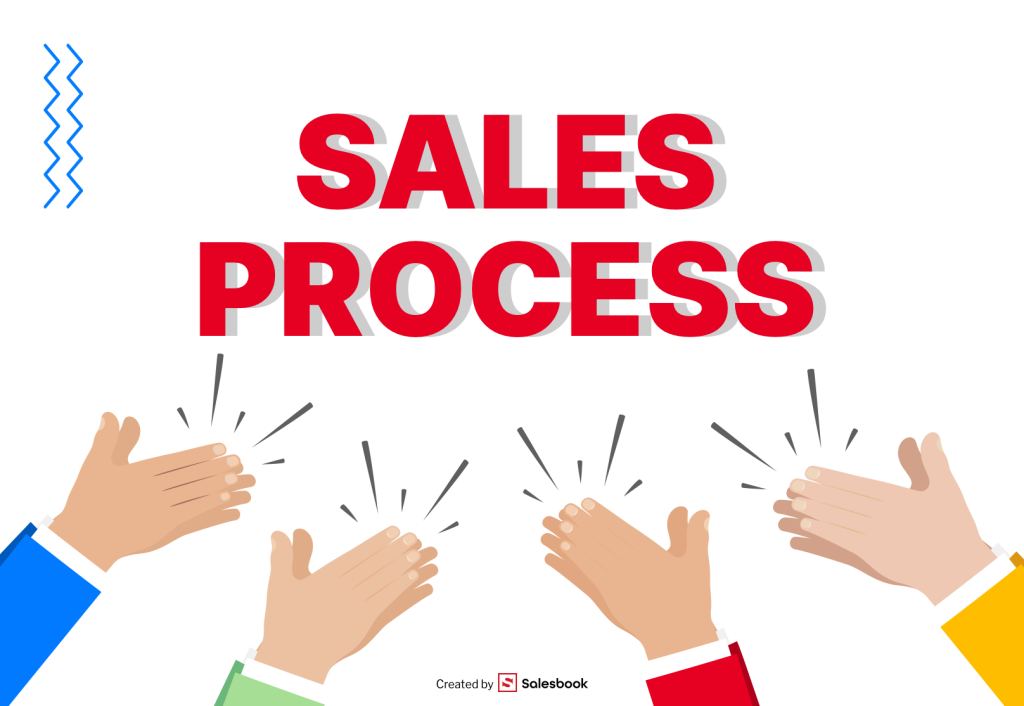
In the intricate dance of sales, balancing innate talent and a refined process can be the ultimate game-changer. Salesbook emerges as a pivotal partner in this endeavor, designed to elevate both the gifted and the developing sales professional.
For the talented salesperson, flair and instinct might come naturally, but organization, optimization, and scalability can pose challenges. Here, Salesbook steps in as an invaluable asset, providing advanced tools that help these high-performers systematize their approach. It offers features for efficient lead management, pipeline visualization, and performance analytics, all aimed at helping talented individuals manage their workflows more effectively, identify areas for improvement, and ultimately, close more deals.

On the other hand, for the developing sales rep, what they might lack in natural prowess is compensated for with Salesbook’s robust, data-driven sales process. The platform provides a clear roadmap from prospecting to closing, ensuring that every representative has a proven strategy to guide their interactions.
By presenting a structured pathway, Salesbook ensures these reps can deliver a consistently high-quality customer experience, boosting their confidence and competence, and significantly improving their success rates.
Moreover, Salesbook recognizes that continuous learning is key to sales success, regardless of innate talent. The platform offers educational resources and regular feedback, facilitating ongoing professional development for all users.
In essence, Salesbook is not just a tool but a partner, committed to every sales professional’s growth. It champions the idea that with the right support, structure, and dedication, anyone can excel in sales — it’s not just the domain of the naturally gifted. Whether it’s honing raw talent or elevating developing skillsets, Salesbook is your ally in mastering the art of sales, fostering a team where talent and process work in seamless synergy.

Our satisfied customers will tell you best how Salesbook has changed their business reality, helped salespeople to discover their potential and the company to develop a great sales strategy.
“The system’s implementation has benefited the sales department and the company’s management. By being able to analyze the offers created by salespeople, management can better understand what attracts customers. This allows for more focused and effective marketing activities.”
– Denis Retat, Brand Manager, Polaris
“Thanks to the new tool, it was possible to improve the client’s experience during a meeting, standardize the advisory process and implement mechanisms improving its quality”
– Robert Gowin, Member of the Board, Unum Życie
“Thanks to Salesbook, managers have accurate and reliable information not only on sales meetings at our showrooms, but also on the number of test drives conducted and offers sent.”
– Michał Cieślar, Sales Director, Kawasaki

Salesbook distinguishes itself by empowering all sales reps to excel, regardless of their inherent skill level. For the naturally adept, it offers organizational tools that refine instinct into strategy, enhancing efficiency.
For those less innately skilled, it provides a robust, data-driven framework that elevates their sales approach, boosting both confidence and results.
In both cases, Salesbook’s blend of intuitive design, actionable analytics, and continuous learning resources fosters an environment where every salesperson can thrive, demonstrating that the key to sales success is neither talent nor process alone, but the strategic integration of both.

Sales mastery is attained not by choosing between talent and process, but by skillfully merging the two.
Salesbook plays an integral role in this balance, providing a platform where every sales professional, regardless of innate talent, can thrive. By offering systematic efficiency to the gifted and a success roadmap to the methodical, Salesbook demonstrates that the path to sales excellence is a cohesive strategy that leverages both personal strengths and proven techniques.
The ultimate goal is a sales force where every member is empowered, effective, and poised to succeed.
In wrapping up, it’s clear that process and talent in sales are an indivisible duo. Talent brings to the table innate abilities that, while powerful, can be unpredictable and inconsistent without the structure. Process introduces this much-needed framework, guiding talent while providing a replicable, scalable system for success.
Neither exists in a vacuum; both feed into and bolster the other. Salesbook epitomizes this synergy by offering a platform that enhances organizational prowess for the talented and lays a clear, data-driven pathway for those developing their craft. It’s not about choosing one over the other but leveraging both in tandem to unlock unparalleled sales proficiency.

Embrace the future with Salesbook, a solution designed to fortify your sales strategy against the ever-evolving market landscape. By harmonizing the innate capabilities of your sales force with a structured, adaptable process, Salesbook ensures your team is equipped not just for the challenges of today but for the uncertainties of tomorrow.
Its suite of tools is geared for sustainability, embedding continuous learning and adaptability at the heart of your sales operations, thus preparing your team to navigate, adapt, and thrive amidst change. With Salesbook, you’re not just keeping pace with the present; you’re leapfrogging into the future, armed with a strategy that’s resilient, agile, and poised for enduring success.

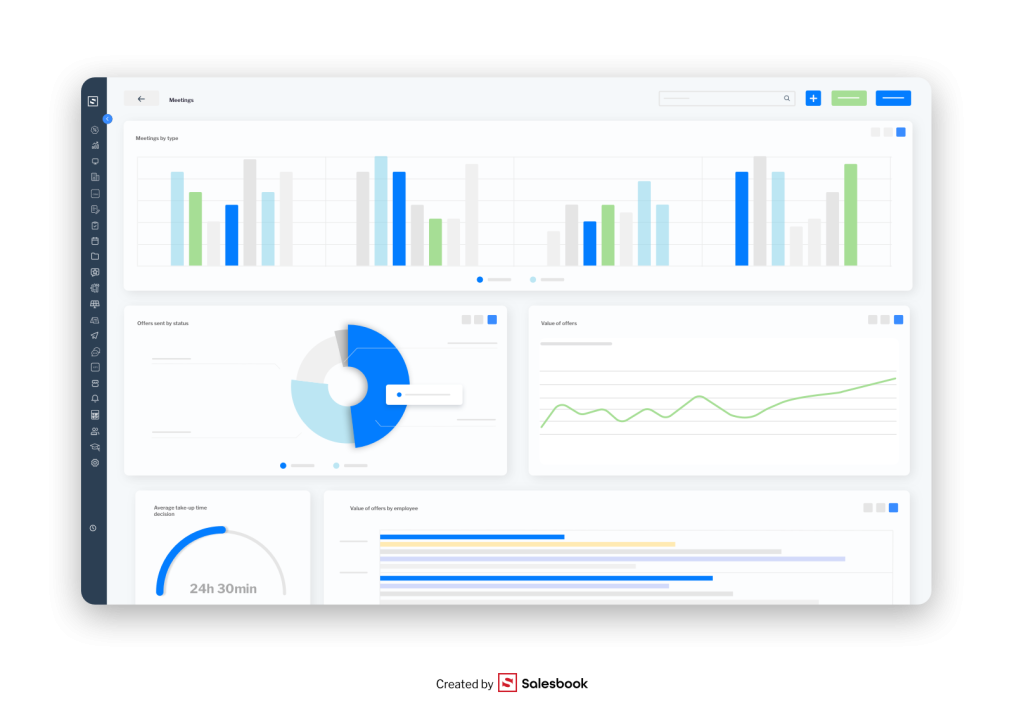
In the journey towards sales mastery, the choice isn’t between talent and process. It’s about harmonizing the distinctive strengths of both to unlock unparalleled growth and efficiency. As we delve deeper into this dialogue, we will explore the symbiotic relationship between a sales rep’s talent and the sales strategy, emphasizing why this balanced approach is indispensable in the ever-evolving sales landscape.
Whether it’s maintaining a robust sales pipeline, ensuring that the sales cycle is as efficient as possible, or refining sales strategies to ensure they resonate with target customers, Salesbook is the key to balancing and optimizing these elements for sales teams.
Opt for success with Salesbook, the tried-and-true platform that fortifies your effective sales strategy. It’s not just about managing leads; it’s about securing victories.
Choose reliability, choose efficiency, choose Salesbook.
You don’t have to take our word for it that Salesbook is the best sales management tool.
Make an appointment for a free demo and see first-hand how our platform can help you organize your sales team and use the talent you already have in your organization to create a reliable sales process.

Any questions? Feel free to contact us.
+44 203 807 0179
Our Customer Success Team is available from Mon. to Fri. 9am - 5pm CET.
We support inquiries, processes of configuration and use of Salesbook app, as well as billing and technical issues.
